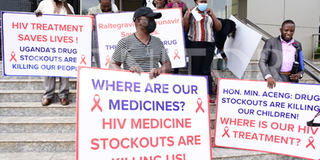Prime
Protests as ARV drugs shortage hits Uganda

Some of the activists hold placards at the Ministry of Health offices on July 27, 2022. PHOTO | ABUBAKER LUBOWA
Persons Living with HIV (PLHIV) have raised concern over the shortage of anti-retroviral (ARV) drugs in hospitals in the last six months, specifically the third-line treatment.
The PLHIV and civil society organisations (CSO), which work with infected or affected persons, stormed the Ministry of Health headquarters in Kampala yesterday demanding an explanation for the stock-outs which they said began in November last year.
However, the Ministry of Health dismissed the allegations saying they sent the drugs to health facilities last week.
In a joint statement, the CSOs and PLHIV said the shortages are increasing drug resistance, treatment failure and deaths among infected persons in the country.
“Over the last nine months, monitoring of the quality and accessibility of the HIV response carried out by PLHIV and other directly affected communities –has exposed chronic shortages of HIV treatment at facilities across the country, particularly third-line medicines such as raltegravir and darunavir,” the statement reads.
The third-line treatment is for PLHIV who are responding to first and second-line drugs. These categories of people are often immunocompromised (the immune system’s defences are low, affecting its ability to fight off infections and diseases) and are at significant risk of developing Aids and dying, according to scientists.
“Today CSOs sought immediate resolution to the life-threatening crisis of HIV ARV treatment stock-outs in the country,” the statement reads further.
Ms Salome Atim, a representative of PLHIV at the Country Coordinating Mechanism of Global Fund, said there are 2,500 people on third-line treatment.
“As a community of PLHIV, we are concerned about the stock-out that we are experiencing as individuals. We kept discussing the issues with the Ministry via email but we were not getting a solution so we decided to approach the Ministry physically for clear explanations,” she said.
Mr Moses Nsubuga, another PLHIV activist, said: “Some patients have been put back on second-line medication which failed many years ago. The Ministry of Health has no guidelines on what health workers should do if such shortages are experienced,” he said.
According to the CSOs, the lack of third-line medicines will hamper the government’s race to cut mother-to-child transmission of HIV and end HIV/Aids as a public health threat by 2030.
At the Health ministry offices, the group met a junior official who promised to forward their grievances to the senior officials.
In an interview with Daily Monitor yesterday, the director general of Health Services at the Ministry of Health, Dr Henry Mwebesa, said: “There are adequate third-line drugs in the country and Joint Medical Stores (JMS) and National Medical Stores (NMS) completed the distribution last week.”
“These are drugs for 900-1,000 patients. In some cases Implementing Partners (IPs) helped to deliver for some sites that had run out,” he added.
But Ms Joan Kilande, an activist from the Coalition for Health Promotion and Social Development, said the ARVs being supplied by NMS have a very short expiry of July 31.
Dr Mwebesa also admitted that there were some issues with one of the third-line drugs.
“NMS is also handling the darunavir which is another one of the third line categories. We already had some in the country which when NMS distributes will just be augmenting on,” he said.
He didn’t specify the amount that is already in the country, leaving questions of whether this could be contributing to the shortages experienced by the PLHIV.
He asked the activists to stop generalising issues and point out specific facilities with stock out so that deliveries can be made immediately.




